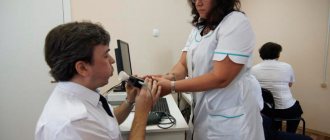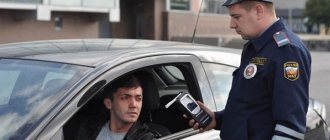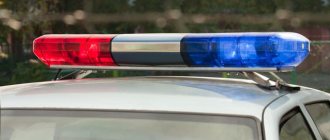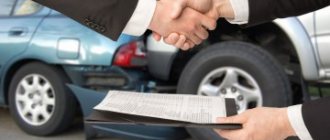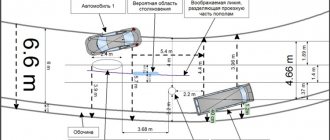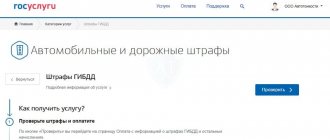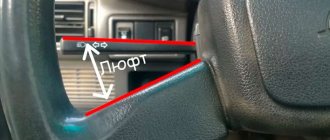- July 27, 2018
- Administrative law
- Marina Lobacheva
Any car owner must use his car only when sober. For drunkenness, serious penalties are applied to citizens, represented not only by a large fine, reaching 300 thousand rubles. for repeated violations, but even deprivation of rights and freedom for up to two years. Often, car owners are faced with the fact that traffic inspectors require a medical examination. Every person is aware of the state he is in, so if he is sure that he is sober, then it is advisable to undergo an independent medical examination for intoxication. This will allow you to challenge the results of the inspection conducted by the traffic inspector.
When is the inspection carried out?
An alcohol intoxication test is required when a traffic inspector notices that the driver shows signs of intoxication. They may be as follows:
- incoherent speech;
- drunken gait;
- unpleasant and characteristic odor.
The verification procedure consists of two stages. Initially, a breathalyzer is used on site, with the help of which it is determined how much alcohol is present in the vapor exhaled by the citizen. If the participants in the process do not agree with the results, then a medical examination is carried out to determine the state of intoxication. The process is performed in special inpatient medical institutions or special mobile units. To do this, blood and urine tests are taken, and the driver exhales into a breathalyzer twice.
Often, based on the results of a medical examination for intoxication, it is revealed that the citizen is indeed drunk. If even after this check the driver is confident that there is no alcohol in his blood, then it is advisable for him to contact special medical centers to conduct an independent study. If the conclusion of a medical examination for the state of intoxication, carried out again, differs from the initial report, then the decision can be challenged. Additionally, the traffic inspector and medical workers can be held accountable through the court.
Features of the intoxication examination procedure
Referral to a medical institution to undergo an appropriate examination of the driver is made by an official monitoring road safety - a traffic police officer or a traffic police officer. The driver is immediately suspended from driving .
In this case, two witnesses must be present to monitor how the protocol is drawn up (a special form was developed jointly by the Ministry of Internal Affairs and the Ministry of Health), a copy of which is given to the motorist suspected of violating the rule “only drive sober.”
There may not be any witnesses if the entire process of communication between the traffic cop and the driver is captured by a video camera. This provision was introduced on November 15, 2014.
The reason for the decision to conduct a medical examination may be:
- the driver’s refusal to check his blood alcohol level on the spot – a “police examination”;
- lack of agreement on the part of the driver with the results of the examination and refusal to sign the protocol;
- Despite the negative conclusion of the inspection, there are strong reasons to suspect the use of intoxicating drinks or narcotic substances.
In such situations, employees of the relevant law enforcement agencies establish the identity of the road user, record in the accompanying documents the results of the on-site examination or the fact of its refusal, and send him for further examination .
Even the absence of documents will not interfere with personal identification, because a traffic police officer can “identify” the owner of a car using license plates. He will simply enter into the protocol the way in which he clarified the driver’s identity.
There are several requirements for an institution in which such a procedure can be carried out. First of all, it must be a medical institution that has the appropriate license. Not just any hospital or clinic, but an organization that has permission to provide services such as examinations.
The driver will not necessarily be taken to the nearest hospital that meets the requirements of the Ministry of Health, because the procedure for checking the presence of alcohol in the body can also be carried out in mobile first aid stations equipped specifically for these purposes. This is not an ambulance, but a full-fledged mobile laboratory.
The specialist conducting the examination must be a narcologist , or receive appropriate training, for example, a paramedic in rural areas can easily replace a narcologist in this procedure, but in any case, the participation of a doctor is mandatory, and the role of a nurse is to assist the specialist in the medical examination.
A medical professional uses devices to determine alcohol vapor in exhaled air , clinical tests to detect intoxication by behavior and well-being, or laboratory tests of biomaterials to detect narcotic and other substances in the blood or urine.
Based on the results of the inspection and research, a medical examination report is drawn up, certified by the doctor’s signature and the seal of the institution, in triplicate, which are distributed as follows :
- the first is given to the driver;
- the second remains in a medical facility;
- the third is handed over to the official who delivered the car owner to the procedure.
Additionally, data about the procedure performed and its results are entered into a special journal maintained at the medical institution. As a conclusion, an employee of a medical organization enters a verdict: alcohol intoxication has been established or not established.
Based on this, a representative of the traffic police then acts - formalizes a refusal to initiate an administrative case and takes him back to the vehicle , or starts the case and acts according to the instructions.
In fact, they will create a special card for you with the results of a medical examination for alcohol intoxication, which will reflect the values obtained during each study conducted.
Rules for challenging a decision
Traffic inspectors do not have the right to independently deprive drivers of their licenses. Therefore, this procedure is performed exclusively by the court after considering all documents related to this case. To do this, the results of a medical examination for intoxication are taken into account. But even if the traffic inspector has this document, there are certain situations when the result can be challenged. In this case, no liability measures will be applied to the driver.
The dispute must be handled by the direct owner of the car. If he is sure that he was driving the car while sober, then it is advisable to take advantage of an independent medical examination for intoxication. In this case, it can be proven that the citizen was in fact sober.
Reasons for challenging the decision
To challenge a ruling that establishes that a driver was driving while drunk, various grounds may be used. The most commonly used reasons are:
- based on the results of an independent medical examination for alcohol intoxication, carried out within two hours after the initial examination, it is established that the citizen is sober;
- the inspection report was not drawn up correctly, since traffic police officers used a breathalyzer with violations;
- when drawing up the act, no witnesses were invited;
- when drawing up a medical examination report, the doctor made significant errors, on the basis of which this document is invalidated;
- while studying the document, it is revealed that there are corrections in it that are not certified by officials of the medical institution;
- the traffic inspector did not offer the driver to undergo a check at the stop;
- there are other significant doubts about the validity and relevance of the act, for example, the device used by the traffic inspector was not equipped with a seal;
- the traffic inspector had no legal grounds for using a medical check of the driver.
The most effective is the use of independent research. But this method is relevant if the driver is really sure that there is no alcohol in his blood.
What are the specifics of an alcohol intoxication test?
In this regard, it should be noted the importance of conducting an alcohol examination at the pre-trial and judicial stages of consideration of criminal and administrative offenses. The results of the examination must be included in the case and taken into account when determining the degree of responsibility of the person who committed the unlawful act.
The initial examination for alcohol intoxication is carried out directly at the scene of the incident. It is based on the following physiological parameters:
- Alcohol smell.
- Vestibular disorders (shaky gait, uncoordinated movements).
- Articulation disorders and slow speech.
- Inappropriate and delayed behavioral reactions.
The next stage of the medical examination is carried out by a medical commission by decision of the executive body. A person with a written referral may appear at the medical commission independently or be accompanied by a representative of the law enforcement system.
The commission is notified of the reason and purpose of the examination, after which it conducts an interview and examination of the person sent for examination, and enters into the report all the identified facts and diagnostic results.
Testing the ethanol content in the body is carried out by determining its concentration in the blood and urine, expressed in ppm (g/l). If indicators exceed normal values, a protocol is drawn up in triplicate, which is signed by all members of the commission. Instances are distributed as follows:
- The first remains in the institution that conducted the study.
- The second is awarded to a law enforcement representative.
- The third is given to the person being examined.
At the final stage of alcohol and drug testing, a medical report is issued.
The nuances of passing a re-inspection
If the driver does not agree with the results of the on-site examination and check at the medical institution where he was sent by the traffic inspector, then he can undergo an independent medical examination for intoxication. To do this, the following nuances must be taken into account:
- the process is carried out exclusively within two hours after the initial study, since otherwise the results will not be accepted by the court, since there is a possibility that alcohol will already be removed from the body;
- Only a medical institution that has a license for this activity is selected for the procedure, and it must also have the appropriate equipment to perform this task;
- You can contact not only government organizations, but also commercial companies;
- the results of a study conducted in a government institution are positively perceived by the court, since there are no doubts about the veracity of the test;
- the driver must receive a special report based on the results of the study;
- the check is paid, so you will have to pay a certain amount of money for the procedure.
Applying for a second medical examination for alcohol intoxication is only relevant if the citizen is truly confident that he is right. If the act states that there is alcohol in the blood, then it will not be possible to challenge the decision.
What questions should an independent drug testing examination answer?
In order to recognize the legality of the conclusion of a medical examination, drug testing is carried out on the basis of state or private enterprises that have licenses to conduct examinations at the state level.
To increase objectivity and trust on the part of the person who has become the subject of the examination, he has the right to demand an independent drug examination. It provides for the creation by accredited expert organizations or the interested party himself of an independent medical commission consisting of specialists from regional and local drug treatment institutions. It usually includes a psychiatrist-narcologist, a psychologist, a neurologist and a therapist.
The scope of competence of the medical commission includes assessing and issuing opinions on the following points:
- Whether the subject is in a state of drug, pathological or alcohol intoxication at the time of the drug examination.
- The presence of dependence on alcohol, psychotropic and/or narcotic substances, as well as at what stage the person being examined is.
- Frequency of drinking and drug use
- Is compulsory drug treatment a necessary measure?
- Are there contraindications to a certain method of therapy?
When examining for drug intoxication, the type and method of drug consumption is also determined.
Pre-trial procedure for challenging
After receiving the results of the study, it is not recommended to immediately sue the traffic police officer. Initially, it is advisable to use administrative challenge. It involves filing a complaint with the management of the traffic police department where the employee who drew up the report works.
The procedure must be completed within 10 days after the document is issued. The appeal is considered within ten days. If the organization refuses to change or destroy the protocol, then the problem will have to be resolved through the courts.
Judicial order
If a correctly completed medical examination report for intoxication indicates that the citizen was sober at the time of driving, then it will not be difficult to challenge the report. To do this, follow these steps:
- the statement of claim is drawn up correctly;
- you must go to court at the location of the traffic police unit where the traffic inspector who issued the report works;
- all the circumstances of the case are given in the claim;
- it is indicated that immediately after the check by the traffic police officer, he contacted an independent organization for a repeat test, the results of which did not reveal alcohol in the blood;
- The statement received from the doctors is attached to the claim.
If the court finds that the examination by the traffic inspector was actually carried out with many violations or using a device that was not equipped with the necessary elements, then this will lead not only to the cancellation of the decision, but also to holding the traffic police officer accountable.
Sobriety monitoring devices
Organoleptic studies are necessarily part of the procedure for determining the alcohol content in the driver’s blood. The medical report contains sections that indicate the characteristics of a person’s vegetative-vascular reactions, the characteristics of his speech during the period of detention, and characterizes his appearance. Urine and exhaled air are taken for analysis. A blood test is also done less frequently. It is important to know that the survey can be considered completed and carried out only if it was carried out in full and with acceptable instruments.
Laboratories today contain a lot of specialized instruments for monitoring people’s sobriety. Modern research is also carried out in the context of detecting alcohol and biological fluids of a suspect, for which certain instruments are used. In the absence of any instruments in the laboratory, experts use their simplest substitutes - tubes. According to metrological classifications, it is impossible to fully measure with tubes all those indicators that are necessary to establish the degree of alcohol intoxication. These tubes are called “sobriety control” tubes. They are used as follows: first, the driver exhales air, and if there is alcohol in it, the tube is colored. The action takes only 2 minutes.
Which doctors examine the driver?
The procedure for a medical examination for intoxication involves a thorough examination of the citizen’s condition. Several specialists are involved for this:
- a psychiatrist assessing the emotional state of the victim;
- a narcologist who examines the driver’s exhaled vapor, urine and blood;
- therapist writing the report.
Doctors check several factors at once. These include not only the presence of a certain amount of ppm in the blood, but even the general condition of the person. Urine and blood tests are taken, and the skin is also examined by doctors, as they must make sure that prohibited substances were not introduced directly into the citizen’s blood. Often special tests are used to determine whether the performance of a person’s speech apparatus corresponds to a certain norm.
Process Features
Every driver who wishes to take advantage of an independent study should know how a medical examination for intoxication is carried out. The rules of the process include:
- Initially, a general examination of the driver is carried out by a therapist and a narcologist;
- further, a breathalyzer is used to determine whether there is alcohol in the exhaled vapor;
- A urine and blood test is taken, which allows us to detect not only the presence of alcohol in the body, but also various other prohibited substances.
It is preliminarily established whether the driver took any medications before driving that could affect the results of the study.
If the first test does not show the presence of alcohol in the blood, then a second test is not done, which is indicated in the test report. Additionally, testing for clinical signs of intoxication is used. All data obtained must be indicated in the act of an independent medical examination for intoxication.
How is the examination carried out?
The inspection is carried out in accordance with the Procedure approved by order of the Ministry of Health of the Russian Federation No. 933n dated December 18, 2015, and consists of several procedures:
- Breath alcohol testing.
- Inspection by a specialist.
- Urine analysis for psychoactive substances.
- Determination of levels of psychoactive substances in blood or urine.
Breath alcohol testing is a simple and quick test; this is what traffic police officers conduct when they ask the driver to “blow into a straw.” If the alcohol content in the exhaled air is more than 0.16 mg per liter, the result is considered positive. It needs to be rechecked - re-test in 15–20 minutes.
The examination can be carried out by a narcologist or a paramedic who has undergone appropriate training. The specialist looks for characteristic signs of intoxication, including:
- smell from the mouth,
- unsteady posture and gait,
- speech changes,
- inappropriate behavior
- change in facial skin color.
If the result is negative, there is no need to repeat the test.
If during the examination the doctor found at least three signs of intoxication, and the first or repeated breath test showed a negative result, a more serious analysis needs to be carried out. It will help you figure out whether the person took psychoactive or narcotic substances, and if so, which ones. To do this, urine or (if the person is unable to urinate) blood is collected and sent for chemical and toxicological analysis.
Chemical-toxicological examination of blood and urine is carried out in two stages:
- Preliminary analysis by immunochemical method using special multitests. This helps to detect a particular substance in biological material.
- Confirmatory analysis in a chemical-toxicological laboratory. If the preliminary analysis shows a negative result, confirmation is not carried out.
What does the act contain?
Many drivers, confident that they were driving sober, prefer to undergo an independent medical examination for intoxication. The procedure ends with doctors drawing up a special report. It contains the following information:
- it is established whether the citizen is really intoxicated;
- indicates whether the person refused to undergo certain tests.
If the document states that the driver is indeed sober, then you can apply this document to the traffic police or directly to the court to challenge the protocol. The procedure is considered quite complicated, but in this case, an appeal can be made against a medical examination for intoxication performed in the institution where the driver was taken by the traffic police officer. This can lead to negative consequences for the organization, since the court determines that doctors use false information.
When is such an examination relevant?
Drug testing is usually associated with various offenses of a criminal, civil or administrative nature, carried out in a state of alleged drug or alcohol intoxication. It can be:
- Road traffic accidents.
- Crimes based on mental disorders caused by alcohol, psychotropic substances and drugs.
- Deprivation of parental rights as a result of failure to fulfill parental responsibilities by persons with persistent alcohol and/or drug addiction.
In addition, drug testing is necessary when:
- Applying for contract military service.
- Admission to special military educational institutions.
- Registration of guardianship or adoption.
- Invalidation of documents and agreements signed by a person in a state of intoxication.
- Referral for compulsory treatment for addiction.
- Registration/deregistration at a drug treatment clinic.
- Restoration of parental rights and legal capacity.
- Determining the child’s place of residence.
- Work in government structures.
- The desire to prove one’s own innocence in court proceedings.
In the latter case, the best option would be an independent examination.
How to protect yourself from deception and collusion?
There are often cases when drivers are faced with the fact that doctors and traffic inspectors are in cahoots, therefore, based on the results of examinations, it is established that the citizen is intoxicated. If a person is confident that he is completely sober, then he is not allowed to agree with the research results, so it is advisable to challenge them with the help of an independent examination.
To protect yourself from deception and possible collusion, it is recommended to consider the following facts:
- it is not allowed to refuse the examination, as this is regarded by the traffic inspector as driving while intoxicated;
- You must communicate with police officers politely and calmly;
- if a video recorder is installed on the car, then it must be turned on, since due to the presence of a recording device it can be proven that the traffic police officer extorted money or violated the law by other actions;
- Before using a breathalyzer, it is advisable to request documents for this device from the traffic inspector to ensure that it is up to date and operational;
- it is not allowed to enter any information into the protocol under the dictation of a traffic police inspector, therefore all data is entered independently based on the facts identified;
- if the traffic inspector does not invite witnesses to the examination, then the motorist can demand their presence, otherwise he can refuse to use the breathalyzer;
- it is not allowed to sign various documents issued by a traffic police officer, so you should insist on drawing up a protocol;
- It is not allowed to agree to collusion or scams.
Raids, on the basis of which traffic police officers identify drunk drivers, are common and frequent. Often, traffic inspectors insist that a particular car owner is drunk, even in the absence of signs of intoxication. In this case, every citizen should know how to protect themselves from slander. If, even after passing a medical test, it is determined that he is drunk, then it is advisable to use an independent study. The procedure for medical examination to determine whether a driver is intoxicated is considered simple and clear. If, after a repeated check, it is revealed that the citizen is completely sober, then it is easy to challenge the results of the previous assessment.
The nuances of challenging
If a citizen decides to challenge the results of a past examination in a medical institution, then they must take into account the following nuances:
- a repeat test must be performed within two hours after the last test, this ensures that alcohol could not in any way be eliminated from the human body;
- doctors are required to provide documents confirming the citizen’s identity, since information from these documents is included in the examination report;
- in the selected institution, an application for passing a test is drawn up on the basis that the person does not agree with the results of a previous test for intoxication;
- during repeated studies, material is taken in two copies for assessment, since one copy must be kept until the trial, since the judge may require additional verification;
- in order for the results to be reliable and relevant, it is recommended to donate urine, blood and saliva, which will provide the citizen with more arguments in his favor in court;
- If a person cannot undergo an independent study within the established time frame, then urine can be donated within 12 hours after drawing up the protocol.
If a traffic inspector takes away a driver’s license, but the citizen is sure that he is sober, then he must use all possible means to defend his position. By taking tests yourself at a government medical institution, you can confirm that you are right. Under such conditions, the charges are dropped through the court, and traffic inspectors are often brought to criminal liability for colluding with medical companies that draw up false reports.
